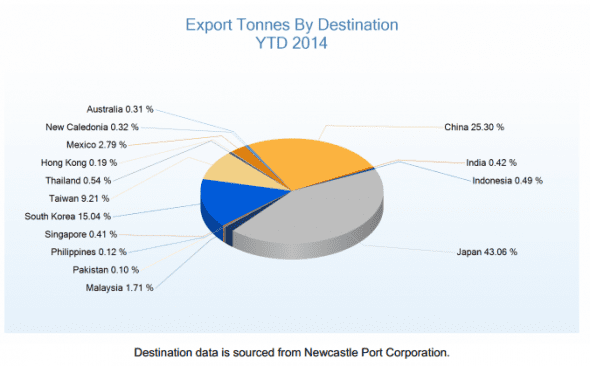Worse news for Australia as India taps solar, Beijing bans coal
Original Post: By Sophie Vorrath
As Australia’s federal government commits to a future digging up, burning and most of all exporting the nation’s vast coal resource, two of the countries upon which this shaky economic plan is most dependent – India and China – look to be closing the door on the heavy polluting fossil fuel.
In Delhi last week, the Indian government committed to a plan to provide low-cost loans and grants to set up some of the world’s largest solar PV parks across the country, each of them comprising as much as 20 gigawatts of capacity, about 10 times what India has built to date.
The parks will host large plants ranging between 500 megawatts to 1,000MW that will be connected to the grid. State utilities will be expected to purchase at least 20 per cent of the power generated at the parks, leaving project owners free to export the remainder of electricity to consumers elsewhere in the country.
“We’re preparing a scheme for solar parks and it will be out after cabinet approval in about one month,” said Tarun Kapoor, joint-secretary at the Ministry of New and Renewable Energy, speaking at the EQ solar Summit on Friday.
India’s plans are to use scale to drive down solar costs and produce power from at least four of these so-called ultra-mega projects at a maximum of 5,500 rupees a megawatt-hour – that is about 32 per cent below the global average for solar, according to data compiled by Bloomberg, and well below the average for coal-fired power generation. The land used for the projects will also be subsidised by the government to keep project costs low.
Separately, India also plans to auction 1,500MW of PV capacity in its biggest tender yet, the final guidelines of which will be issued this month. The first 750MW are expected to be awarded in bidding by the end of September, according to the state-run power trader overseeing the process, NTPC Vidyut Vyapar Nigam Ltd.
As Tim Buckley wrote on RenewEconomy in May, in the context of waning coal consumption in China, India has become increasingly critical to the stability or continued growth of the seaborne coal market.
Add to this India’s five-year solar lighting goal – a pledge from the newly elected Indian PM, Narendra Modi, that every home in the power-starved nation would be able to run at least one light bulb by 2019, powered by solar – and you have what looks like a much diminished future coal equation for Australia.
China, meanwhile, is moving ahead on plans to address its pollution problem by phasing out coal, with the Beijing Municipal Environmental Protection Bureau announcing on Monday that the districts of Dongcheng, Xicheng, Chaoyang, Haidian, Fengtai and Shijingshan would stop using coal and its related products, and close coal-fired power plants and other coal facilities, by 2020.
According to official Chinese government statistics, coal use accounted for 25.4 per cent of the capital’s energy consumption in 2012 – a figure that is expected to shrink to less than 10 per cent by 2017.

As we have noted before on RenewEconomy, China’s plans to slash its already declining coal use poses a major – but certainly not unheralded – problem for Australia’s coal industry.
According to data from Newcastle’s Port Waratah Coal Services, China has accounted for just over 25 per cent of coal through the Port of Newcastle, the world’s biggest coal export hub in 2014.
On top of this, the price for thermal coal has plunged more than 10 per cent in the last two months – due largely to major importing nations like India making it clear that renewable energy is offering a competitive energy alternative.
Currently, thermal coal is sold for less than $70 on the spot market, well below the mark for Australian producers to make money, let alone the cost of production and the level to get the finance for the massive new projects Prime Minister Tony Abbott is hoping to encourage – or those projects already in the pipeline, like the multi-billion dollar development of what would be one of the world’s biggest coalmines, in Queensland’s Galilee Basin, largely earmarked for export to India.
But, as Buckley noted, problems for Indian coal electricity generators, compounded by a range of other challenges, “mitigate against the chances that India policy makers will favour large-scale centralised coal fired power generation in the future.”
As for China, Greg McKenna says it well on Business Insider today: “there is some hope that a base is being formed and that this news is already baked into the cake but as China moves away from coal use and invests in clean energy it seems any chance of a boom as China grows may prove ephemeral.”
Connect with us on Facebook

No comments:
Post a Comment